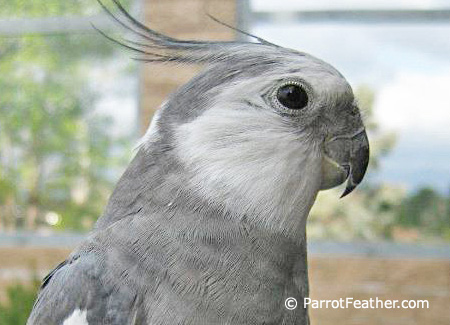Why Does My Cockatiel Hiss?

Listed below are common behavior problems reported in pet cockatiels. Simply click the question below for more information. If your questions cannot be found here, please visit or main cockatiel section or stop by our parrot forum and post your questions.
- Why Does My Cockatiel Bite?
- Why Does My Cockatiel Scream?
- Why Does My Cockatiel Hiss?
- Why Does My Cockatiel Stand On One Leg?
- Why Does My Cockatiel Open His Mouth?
- Why Does My Cockatiel Fly Backwards?
- Why Does My Cockatiel Shiver?
- Why Does My Cockatiel Shake Its Head?
- Why Does My Cockatiel Bang His Beak?
- Why Does My Cockatiel Flap His Wings?
cockatiel Hissing
Cockatiels will sometimes vocally express their discontent and this is sometimes done through hissing. When a cockatiel hisses, this usually means the bird feels distressed, scared, or irritated. This hissing behavior is usually displayed with a cockatiel pulling back its crest, slightly opening its beak, and then producing a hissing sound. Both males and females will hiss if they don’t wish to be petted, or if they feel intimidated by a person or animal, or if they are just moody.
A female cockatiel may hiss to protect a nesting site as a warning to
intruders. Many female cockatiels will avoid confrontation at all costs
and will therefore hiss to intimidate. This type of behavior is used by
a nesting female cockatiel to frighten predators and scavengers away
before they invade a nesting site. If hissing is persists by an
overprotective hen and a predator calls her bluff, the female may can
either become aggressive or she may decide to fly away.
Many female cockatiels will adopt this behavior when they find a nook or
corner they perceive as a nesting site in their owner’s home. This is
especially apparent inside a cage and when a nesting box is placed
inside.
When a cockatiel is hissing, this is a clear sign the bird should be
left alone until it has had time to calm down. When the pet bird is
behaving as it should, the owner can then attempt to reach for the bird
and ask it to step up unto their hand. If the cockatiel complies, the
owner should praise it and reward it with a treat. This positive
reinforcement should be practiced several times each day. Eventually the
bird will look forward to stepping up as it will receive a treat for
doing so.
Though most often hissing is a sign of irritation, it can sometimes be a
sign of excitement - especially in baby cockatiels. For example, baby
cockatiels emit a sound similar to hissing. This sound can almost always
be heard after handfed babies are fed and this usually means the baby is
content and full.
Also, owners should note that mature males will sometime hiss during
courtship before they make their courtship call. This noise usually
follows with a bobbing of the head and singing. This type of hissing is
non-aggressive and some males will incorporate this into their courtship
display.




